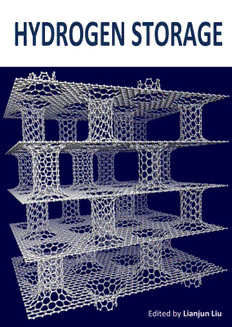
Hydrogen storage PDF
Preview Hydrogen storage
HYDROGEN STORAGE Edited by Lianjun Liu HYDROGEN STORAGE Edited by Lianjun Liu Hydrogen Storage http://dx.doi.org/10.5772/3207 Edited by Lianjun Liu Contributors Sesha S. Srinivasan, Prakash C. Sharma, Jianjun Liu, Wenqing Zhang, Josef-Christian Buhl, Lars Schomborg, Claus Henning Rüscher, Yanghuan Zhang, Hongwei Shang, Chen Zhao, Dongliang Zhao, Kazuhide Tanaka, Sebastian Sahler, Martin H.G. Prechtl, Michail Obolensky, Andrew Basteev, Vladimir Beletsky, Andrew Kravchenko, Yuri Petrusenko, Valeriy Borysenko, Sergey Lavrynenko, Oleg Kravchenko, Irina Suvorova, Vladimir Golovanevskiy, Leonid Bazyma, Seong Mu Jo, Yuriy Zhirko, Volodymyr Trachevsky, Zakhar Kovalyuk, Rahul Krishna, Elby Titus, Maryam Salimian, Olena Okhay, Sivakumar Rajendran, Ananth Rajkumar, J. M. G. Sousa, A. L. C. Ferreira, João Campos Gil and Jose Gracio Published by InTech Janeza Trdine 9, 51000 Rijeka, Croatia Copyright © 2012 InTech All chapters are Open Access distributed under the Creative Commons Attribution 3.0 license, which allows users to download, copy and build upon published articles even for commercial purposes, as long as the author and publisher are properly credited, which ensures maximum dissemination and a wider impact of our publications. After this work has been published by InTech, authors have the right to republish it, in whole or part, in any publication of which they are the author, and to make other personal use of the work. Any republication, referencing or personal use of the work must explicitly identify the original source. Notice Statements and opinions expressed in the chapters are these of the individual contributors and not necessarily those of the editors or publisher. No responsibility is accepted for the accuracy of information contained in the published chapters. The publisher assumes no responsibility for any damage or injury to persons or property arising out of the use of any materials, instructions, methods or ideas contained in the book. Publishing Process Manager Dragana Manestar Typesetting InTech Prepress, Novi Sad Cover InTech Design Team First published August, 2012 Printed in Croatia A free online edition of this book is available at www.intechopen.com Additional hard copies can be obtained from [email protected] Hydrogen Storage, Edited by Lianjun Liu p. cm. ISBN 978-953-51-0731-6 Contents Preface IX Section 1 Chemical Hydrogen Storage Materials 1 Chapter 1 Development of Novel Polymer Nanostructures and Nanoscale Complex Hydrides for Reversible Hydrogen Storage 3 Sesha S. Srinivasan and Prakash C. Sharma Chapter 2 Improvement on Hydrogen Storage Properties of Complex Metal Hydride 29 Jianjun Liu and Wenqing Zhang Chapter 3 Enclosure of Sodium Tetrahydroborate (NaBH ) 4 in Solidified Aluminosilicate Gels and Microporous Crystalline Solids for Fuel Processing 49 Josef-Christian Buhl, Lars Schomborg and Claus Henning Rüscher Chapter 4 The Preparation and Hydrogen Storage Performances of Nanocrystalline and Amorphous Mg Ni-Type Alloys 91 2 Yanghuan Zhang, Hongwei Shang, Chen Zhao and Dongliang Zhao Chapter 5 Hydrogen Storage Properties and Structure of Magnesium-Based Alloys Prepared with Melt-Spinning Technique 119 Kazuhide Tanaka Chapter 6 Application of Ionic Liquids in Hydrogen Storage Systems 147 Sebastian Sahler and Martin H.G. Prechtl VI Contents Section 2 Physical Hydrogen Storage Materials 165 Chapter 7 Postsynthesis Treatment Influence on Hydrogen Sorption Properties of Carbon Nanotubes 167 Michail Obolensky, Andrew Basteev, Vladimir Beletsky, Andrew Kravchenko, Yuri Petrusenko, Valeriy Borysenko, Sergey Lavrynenko, Oleg Kravchenko, Irina Suvorova, Vladimir Golovanevskiy and Leonid Bazyma Chapter 8 Electrospun Nanofibrous Materials and Their Hydrogen Storage 181 Seong Mu Jo Chapter 9 On the Possibility of Layered Crystals Application for Solid State Hydrogen Storages – InSe and GaSe Crystals 211 Yuriy Zhirko, Volodymyr Trachevsky and Zakhar Kovalyuk Chapter 10 Hydrogen Storage for Energy Application 243 Rahul Krishna, Elby Titus, Maryam Salimian, Olena Okhay, Sivakumar Rajendran, Ananth Rajkumar, J. M. G. Sousa, A. L. C. Ferreira, João Campos Gil and Jose Gracio Preface Energy storage became a dominant factor in economic development with the widespread introduction of electricity and refined chemical fuels in the later 1800s. Chemical fuels are the dominant form of energy storage, both in electrical generation and energy transportation. Chemical fuels in common use are processed fossil fuels in the form of coal, oil, and natural gas. The world energy consumption has been constantly increasing since the industrial revolution. However, the supply of fossil fuel is limited. Furthermore, the use of fossil fuel puts human health at risk through chemical and particulate pollutants and affects global climate through CO2 and other greenhouse gas emissions. Hydrogen, as a chemical energy carrier, is widely regarded as a potential cost effective, renewable, and clean energy alternative to petroleum, especially in the transportation sector. Hydrogen storage is becoming a key component of realizing the hydrogen economy for transportation applications. Emerging nanotechnology has generated a significant influence to many fields. Scientists always think, work, and interact to fabricate and optimize new materials and processes in nanometer scale. In turn, these novel nanomaterials and nanostructures are employed to design real devices, therefore, offering unprecedented efficiency or function compared to conventional bulk phase materials. In the recent years, nanotechnology has extensively applied to develop novel hydrogen storage materials. To reflect the rapid growth of these research in hydrogen storage nanomaterials, this book entitled by “Hydrogen Storage Materials through Nanotechnology” summarize the recent research progress in this field. In the past years, there are many books already available covering different topics, nanotechnology or hydrogen storage. However, none summarizes the specific topic with emphasis on nanotechnology applied to improve hydrogen storage properties. It is believed that this book can be suitable as a desk reference related to energy storage materials for scientific researchers, government and organizations, as well as industrial R&D labs. This book includes 10 chapters which are divided into two categories, physical and chemical hydrogen storage materials. Each chapter is written by world-leading scientific experts working in nanotechnology and hydrogen storage, the editor made a great effort to ensure the accuracy and appropriateness of the X Preface materials collected and any comments and suggestions to improve potential future editions are welcome. Lianjun Liu Southern Illinois University USA
